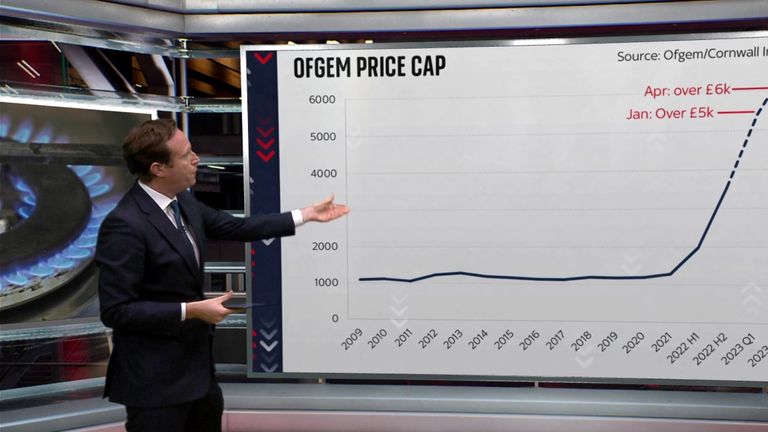Unions are threatening to hold co-ordinated strikes in the coming months as they attempt to secure inflation-matching pay rises for workers struggling with the cost of living crisis.
According to the Observer, a series of motions will be tabled at the Trades Union Congress (TUC) in September, calling for unions to work together to increase the impact of their industrial action.
The TUC’s head of public services, Kevin Rowan, told Sky News they would “support and encourage” unions in the move, so strikes could be “as effective” as possible.
The plan, which has the backing of two of the UK’s biggest unions, Unison and Unite, comes days after the latest figure for the energy price cap was announced, confirming average bills will hit £3,549 a year this winter.
Inflation has also hit a record 40-year high of 10.1%, and is expected to soar to 13.3% when the energy bill rises come into force in October.
‘You don’t see the work we do until we stop’
The motion being put forward by Unite would make the TUC ensure co-ordinated timing for strikes “so workers in dispute can most effectively harness their union power to win”.
Meanwhile, the motion from Unison points to a “low pay crisis”, demanding the TUC brings together union action to campaign for pay rises “at least in line with inflation”.
Eddie Cassidy, Scottish representative for Unite, said the industrial action plan could be viewed as a general strike – although the text of the TUC motions do not go as far as that – saying coordination will increase their effectiveness.
“You don’t see the work that we do until we stop doing it,” he told Sky News from the bin workers’ picket line.
“The only real tool that workers have in their armoury is to withdraw their labour, and when they are doing that they are highlighting to everybody just exactly what it is that they deliver to you.”
He added: “If there is any other way for us to get what we are trying to achieve I am happy to explore that, but at the moment nobody seems to listen.”
Read more:
Who’s proposing what to tackle soaring energy bills?
Who is going on strike this summer – and for how long
‘People want a decent pay rise’
Mr Rowan of the TUC echoed the sentiment, saying workers would prefer to have a different solution than striking.
But, he added: “The fact is we are seeing energy costs go up 35 times faster than wages, food bills are going up, housing costs are going up.
“The only thing not going up is people’s pay.”
Labour’s shadow chief secretary to the Treasury, Pat McFadden, said his party would not support a general strike, despite its affiliation with a number of unions.
However, he told Sky News: “We understand why people are pressing for pay increases.
“Our call on government ministers would be to stop being an absent government and help resolve these disputes to ensure that people get a decent pay rise, but to do that around the negotiating table.
“Nobody wants to see industrial action, but it is understandable why people at work want a decent pay rise given the inflationary pressures that they are feeling right now.”
Subscribe for free to the Daily podcast on Apple Podcasts, Google Podcasts, Spotify, Spreaker
Downing Street has insisted it will be for the next prime minister – either frontrunner Liz Truss or ex-chancellor Rishi Sunak – to decide what cost of living support is needed.
Neither Tory leadership contender has outlined their exact plans, with Ms Truss’ team saying it would “not be right for her to announce her plans before she has been elected prime minister or seen all the facts”.
But reports suggest she is considering a “nuclear” option that could see VAT cut from 20% to 15% – a plan Mr Sunak’s team has branded expensive and “incredibly regressive”.

